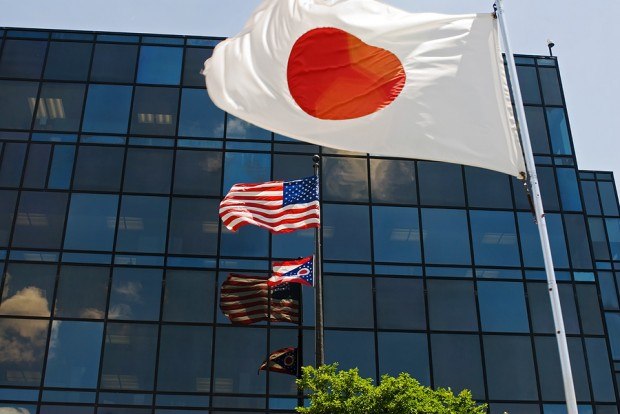Japanese insurers including MS&AD Insurance Group Holdings Inc. and Sompo Japan Nipponkoa Insurance Inc. are seeking mergers with peers in the United States, as a declining population at home forces them to pursue markets that are growing overseas.
Prime Minister Shinzo Abe’s so-called “Abenomics” policies, including a program of unprecedented monetary stimulus, is giving the country’s companies easy access to cheap cash, which they’re planning to spend on promising companies abroad.
Property/casualty insurers are particularly hungry for non-domestic acquisitions because they’re under pressure to spread risk geographically, so that profit generated outside Japan can help offset payouts for typhoon and earthquake damage at home.
The U.S. is an attractive investment destination for Japanese insurers, not just because of its growing market, but also because many U.S. insurers are open to exploring a sale after years of record-low interest rates weighed on their margins and hurt their profits.
Still, it’s a far cry from the late 1980s, when there was a wave of Japanese investments in U.S. real estate trophy assets, including New York’s Rockefeller Center. Then, as opposed to now, the yen was strong and the investments were financial rather than strategic acquisitions.
Last month, Tokio Marine Holdings Inc. agreed to buy U.S. specialty property and casualty insurer HCC Insurance Holdings Inc. for $7.5 billion, the biggest M&A deal this year by a Japanese company and the biggest acquisition ever by a Japanese insurer.
More deals are likely in the offing, industry executives and investment bankers said. MS&AD and Sompo have been adding M&A experts to their business development teams who can identify and execute such acquisitions.
Sompo told Reuters that earlier this month it had appointed Nigel Frudd, a lawyer and director at its specialty insurance arm Canopius Group Ltd, as an executive officer in its M&A team in charge of overseas acquisitions.
“With the M&A team headed by him, we are now in a position to improve quality and speed of studying deals,” Kohei Chida, a spokesman for Sompo, said in an interview. “In corporate insurance lines, we will study possibilities in specialty insurance in the U.S. and Europe.”
MS&AD also told Reuters it was hiring M&A staff, who will be looking at Latin America, Europe and Asia, in addition to the U.S.
“For overseas property and casualty insurance M&A, there is a team within our international business division and we have been increasing the number of staff,” said Masato Naito, a spokesman for MS&AD’s Mitsui Sumitomo Insurance unit. “We also have a different team for overseas life insurance M&A.”
Possible Targets
Japan’s population peaked in 2010 at 128 million, and has been declining ever since. If this trend continues, by 2040 the population will be 107.2 million, according to Japan’s National Institute of Population and Social Security Research.
By comparison, the U.S. population is projected to increase from 321.4 million this year to 380.2 million in 2040, according to the U.S. Census Bureau.
Japan’s insurers are seeking targets with market capitalizations between $2 billion and $5 billion, big enough to provide a meaningful effect to their bottom line but not so big as to risk blowing it up.
Targets in the U.S. property and casualty insurance sector around that price range could include Minnesota-based OneBeacon Insurance Group Ltd; Morristown, New Jersey-based ProSight Specialty Insurance Group Inc. and Bermuda-based James River Group Holdings Ltd, investment banking and industry sources said.
OneBeacon declined to comment, while James River and ProSight spokespeople did not respond to requests for comment.
To be sure, Japanese insurers have been gradually venturing outside their home market in the last few years. In December 2013, Sompo increased its overseas footprint with the acquisition of Canopius. Sompo has also taken a 7.8 percent ownership stake in French reinsurer SCOR SE.
Other Asian insurers could follow suit. Korea’s Samsung Fire and Marine Insurance Co Ltd could emulate its Japanese peers and seek out targets abroad, driven by the same demographic forces seen in Japan, industry executives said.
(Reporting by Mike Stone in New York; Additional reporting by Taiga Uranaka in Tokyo; Editing by Greg Roumeliotis and John Pickering)





















 10 Do’s and Don’ts of a Smart ORSA Report
10 Do’s and Don’ts of a Smart ORSA Report  New Texas Law Requires Insurers Provide Reason for Declining or Canceling Policies
New Texas Law Requires Insurers Provide Reason for Declining or Canceling Policies  Telematics and Trust: How Usage-Based Insurance Is Transforming Auto Coverage
Telematics and Trust: How Usage-Based Insurance Is Transforming Auto Coverage  Large Scale Cargo Ring Busted in LA, $5M Recovered
Large Scale Cargo Ring Busted in LA, $5M Recovered 











